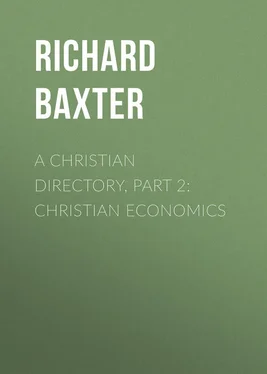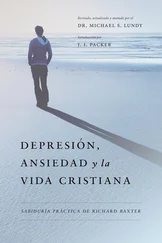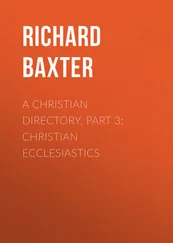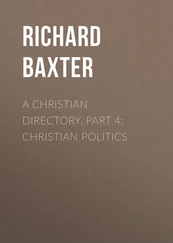Richard Baxter - A Christian Directory, Part 2 - Christian Economics
Здесь есть возможность читать онлайн «Richard Baxter - A Christian Directory, Part 2 - Christian Economics» — ознакомительный отрывок электронной книги совершенно бесплатно, а после прочтения отрывка купить полную версию. В некоторых случаях можно слушать аудио, скачать через торрент в формате fb2 и присутствует краткое содержание. Жанр: foreign_antique, foreign_prose, на английском языке. Описание произведения, (предисловие) а так же отзывы посетителей доступны на портале библиотеки ЛибКат.
- Название:A Christian Directory, Part 2: Christian Economics
- Автор:
- Жанр:
- Год:неизвестен
- ISBN:нет данных
- Рейтинг книги:5 / 5. Голосов: 1
-
Избранное:Добавить в избранное
- Отзывы:
-
Ваша оценка:
- 100
- 1
- 2
- 3
- 4
- 5
A Christian Directory, Part 2: Christian Economics: краткое содержание, описание и аннотация
Предлагаем к чтению аннотацию, описание, краткое содержание или предисловие (зависит от того, что написал сам автор книги «A Christian Directory, Part 2: Christian Economics»). Если вы не нашли необходимую информацию о книге — напишите в комментариях, мы постараемся отыскать её.
A Christian Directory, Part 2: Christian Economics — читать онлайн ознакомительный отрывок
Ниже представлен текст книги, разбитый по страницам. Система сохранения места последней прочитанной страницы, позволяет с удобством читать онлайн бесплатно книгу «A Christian Directory, Part 2: Christian Economics», без необходимости каждый раз заново искать на чём Вы остановились. Поставьте закладку, и сможете в любой момент перейти на страницу, на которой закончили чтение.
Интервал:
Закладка:
Answ. 1. I have already showed you, that it is plainly required in the Scripture: but men must not teach God how to speak, nor oblige him to make all plain to blind, perverted minds. 2. Those things which were plainly revealed in the Old Testament, and the church then held without any contradiction, even from the persecutors of Christ themselves, might well be passed over in the gospel, and taken as supposed, acknowledged things. 3. The general precepts (to "pray alway, – with all prayer, – in all places," &c.) being expressed in the gospel, and the light of nature making particular application of them to families, what need there any more? 4. This reason is apparent why Scripture speaketh of it no more expressly. Before Christ's time the worship of God was less spiritual, and more ceremonial, than afterward it was; and therefore you find ofter mention of circumcision and sacrificing, than of prayer; and yet prayer was still supposed to concur. And after Christ's time on earth, most christian families were disturbed by persecution, and christians sold up all and lived in community: and also the Scripture history was to describe to us the state of the churches, rather than of particular families.
Object. II. Christ himself did not use to pray with his family; as appeareth by the disciples asking him to teach them to pray, and by the silence of the Scripture in this point: therefore it is no duty to us.
Answ. 1. Scripture silence is no proof that Christ did not use it. All things are not written which he did. 2. His teaching them the Lord's prayer, and their desire of a common rule of prayer, might consist with his usual praying with them: at least with his using to pray with them after that, though at first he did not use it. 3. But it is the consequence that I principally deny. (1.) Because Christ did afterwards call his servants to many duties, which he put them not on at first, as sacraments, discipline, preaching, frequenter praying, &c. especially after the coming down of the Holy Ghost. As they understood not many articles of the faith till then, so no wonder if they understood not many duties till then; for Christ would have them thus suddenly instructed and fullier sanctified by a miracle, that their ministry might be more credible, their mission being evidently divine, and they being past the suspicion of forgery and deceit. (2.) And though it is evident that Christ did use to bless the meat, and sing hymns to God with his disciples, Luke xxii. 17, 18; Mark xiv. 22, 23, 26; Matt. xxvi. 27, 28, 30, and therefore it is very probable, prayed with them often, as John xvii.; yet it could not be expected, that he should ordinarily be their mouth in such prayers as they daily needed. His case and ours are exceedingly different. His disciples must daily confess their sins, and be humbled for them, and ask forgiveness; but Christ had none of this to do. They must pray for mortifying grace, and help against sin; but he had no sin to mortify or pray against. They must pray for the Spirit, and the increase of their imperfect graces; but Christ had fulness and perfection. They must pray for many means to these ends, and for help in using them, and a blessing on them, which he had no use for. They must give thanks for pardon and conversion, &c. which Christ had no occasion to give thanks for. So that having a High Priest so much separate from sinners, they had one that prayed for them; but not one fit to join with them as their mouth to God, in ordinary family prayers, such as they needed; as masters must do with their families.
Object. III. God doth not require either vain or abominable prayers; but family prayers are ordinarily vain and abominable; therefore, &c. The minor is proved thus: – The prayers of the wicked are abominable: most families are wicked, or have wicked persons; therefore, &c.
Answ. 1. This is confessedly nothing against the prayers of godly families. 2. The prayers of a godly master are not abominable nor vain, because of the presence of others that are ungodly. Else Christ's prayers and blessings before mentioned should have been vain or abominable, because Judas was there, who was a thief and hypocrite. And the apostles' and all ministers' prayers should be so in all such churches as those of Corinth, Galatia, Ephesus are described to have been. 3. I refer you to my "Method for Peace of Conscience," how far the prayers of the wicked are, or are not abominable. The prayers of the wicked as wicked are abominable; but not as they express their return to God, and repenting of their wickedness. It is not the abominable prayer that God commandeth, but the faithful, penitent prayer. You mistake it, as if the wicked man were not the person commanded to pray; whereas you should rather say, It is not the abominable prayer that is commanded him. He is commanded to pray such prayers as are not abominable; even as Simon Magus, Acts viii. to "repent" and "pray;" and "to seek the Lord while he may be found, and call upon him while he is near, and to forsake his way," &c. Isa. lv. 6, 7. Let the wicked pray thus, and his prayer will not be abominable. The command of praying implieth the command of repenting and departing from his wickedness: for what is it to pray for grace, but to express to God their desires of grace? (It is not to tell God a lie, by saying they desire that which they hate.) Therefore when we exhort them to pray we exhort them to such desires.
Object. IV. Many masters of families cannot pray in their families without a book, and that is unlawful.
Answ. I. If their disability be natural, as an idiot's, they are not fit to rule families; if it be moral and culpable, they are bound to use the means to overcome it; and in the mean time to use a book or form, rather than not to pray in their families at all.
The last part of my work is to speak of the fit time of family worship. 1. Whether it should be every day? 2. Whether twice a day? 3. Whether morning and evening? Answ. 1. Ordinarily it should be every day and twice a day; and the morning and evening are ordinarily the fittest seasons. 2. But extraordinarily some greater duty may intervene, which may for that time disoblige us. And the occasions of some families may make that hour fit to one, which is unfit to another. For brevity I will join all together in the proof.
Arg. I. We are bound to take all fit occasions and opportunities to worship God. Families have daily (morning and evening) such occasions and opportunities; therefore they are bound to take them.
Both major and minor are proved before. Experience proveth that family sins are daily committed, and family mercies daily received, and family necessities daily do occur. And reason tells us, 1. That it is seasonable every morning to give God thanks for the rest of the night past. 2. And to beg direction, protection, and provisions, and blessing for the following day. 3. And that then our minds are freest from weariness and worldly care. And so reason telleth us that the evening is a fit season to give God thanks for the mercies of the day, and to confess the sins of the day, and ask forgiveness, and to pray for rest and protection in the night. As nature and reason tell us how oft a man should eat and drink, and how long he should sleep, and what clothing he should wear; and Scripture need not tell you the particulars: so if Scripture command your prayer in general, God may by providence tell you when and how oft you must pray.
Arg. II. The Lord's prayer directeth us daily to put up such prayers as belong to families; therefore, &c. "Give us this day our daily bread." It runs all in the plural number. And the reason of it will oblige families as well as individual persons.
Arg. III. From 1 Thess. v. 17, "Pray without ceasing; in all things give thanks." Col. iv. 1, 2, "Masters, give to your servants that which is just and equal, knowing that ye also have a Master in heaven. Continue in prayer, and watch in the same with thanksgiving." Col. iii. 17, "Whatsoever ye do in word or deed, do all in the name of the Lord Jesus; giving thanks to God and the Father by him." Phil. iv. 6, "Be careful for nothing, but in every thing by prayer and supplication with thanksgiving, let your requests be made known to God." It is easy for a man that is willing to see that less than twice a day doth not answer the command of praying "without ceasing, – continually, – in every thing – whatsoever ye do," &c.; the phrases seeming to go much higher.
Читать дальшеИнтервал:
Закладка:
Похожие книги на «A Christian Directory, Part 2: Christian Economics»
Представляем Вашему вниманию похожие книги на «A Christian Directory, Part 2: Christian Economics» списком для выбора. Мы отобрали схожую по названию и смыслу литературу в надежде предоставить читателям больше вариантов отыскать новые, интересные, ещё непрочитанные произведения.
Обсуждение, отзывы о книге «A Christian Directory, Part 2: Christian Economics» и просто собственные мнения читателей. Оставьте ваши комментарии, напишите, что Вы думаете о произведении, его смысле или главных героях. Укажите что конкретно понравилось, а что нет, и почему Вы так считаете.












